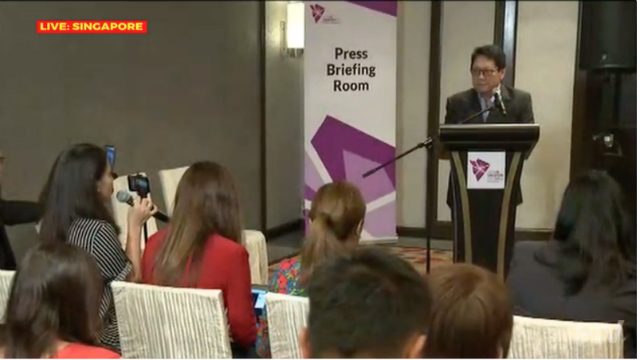SUMMARY
This is AI generated summarization, which may have errors. For context, always refer to the full article.

MANILA, Philippines – The Philippine government barred foreign correspondents from covering a press conference held in Singapore on Friday, April 27, largely about the diplomatic crisis between the Philippines and Kuwait.
A day earlier, the Philippine government prohibited them from asking questions in a press conference on the same topic.
The Philippine government is holding press conferences in Singapore as President Rodrigo Duterte is there to attend the Association of Southeast Asian Nations (ASEAN) Summit, accompanied by Cabinet members.
In a statement on Friday, the Foreign Correspondents Association of the Philippines (FOCAP) deplored the prohibitions on FOCAP members covering in Singapore. The FOCAP members there “are properly accredited by the government’s International Press Center (IPC).”
“The Foreign Correspondents Association of the Philippines (FOCAP) is deeply alarmed by the Philippine government’s strong actions that clearly violate Constitutional provisions on freedom of information,” FOCAP said in a statement.
On Friday, the Department of Labor and Employment (DOLE) prohibited foreign correspondents, including Reuters TV, from attending a press conference with Labor Secretary Silvestre Bello at Orchard Hotel in Singapore.
On Thursday, April 26, the Media Accreditation and Relations Office (MARO) of Malacañang initially barred FOCAP members from covering a press conference with Foreign Secretary Alan Peter Cayetano.
FOCAP members were eventually allowed to enter the press conference venue, on one condition: They cannot ask questions.
‘Curtailment’ of free press
In previous press conferences of Philippine officials on the sidelines of international events, such as the ASEAN Summit, international journalists used to be allowed as long as they have an IPC ID.
FOCAP said that in a meeting with Communications Assistant Secretary Queenie Rodulfo in November 2017, “she agreed to allow Filipinos working for foreign news agencies unfettered access to the president’s media events as well as other international press events.”
“Government must clarify and spell out clear guidelines on media coverage so as to avoid similar incidents in the future,” FOCAP said.
Rodulfo, however, said she was not informed about details of the briefingg rules in Singapore, but the briefing of Presidential Spokesperson Harry Roque on Friday evening “is open for FOCAP members (ideally those accredited in Manila).”
“I don’t have direct access also on the schedule to be given/open to media,” she added.
Communications Undersecretary Mia Reyes earlier said that FOCAP members “were allowed to cover” Thursday’s press conference, but it was Cayetano’s call “to entertain Philippine issues only.”
These restrictions come after Malacañang barred Rappler from the presidential palace and all events attended by President Rodrigo Duterte.
FOCAP enumerated other incidents that curtail press freedom in the Philippines.
These include “the earlier restrictions on press movements during coverage of the war in the southern city of Marawi and those who reported on the closure of the island resort of Boracay.”
FOCAP also said it is “alarmed at reports that the House of Representatives has passed a rule threatening to revoke media accreditation of those whose reports ‘besmirch the reputation’ of the body.”
“FOCAP, as an institution founded at the height of the repressive regime of dictator Ferdinand Marcos in the 1970s, views these as a curtailment of our rights as a free press mandated by the Philippine constitution,” the group said.
Presidential Spokesperson Harry Roque claimed on Thursday that Duterte’s tirades against media do not threaten press freedom, even as the Philippines’ ratings dropped in the World Press Freedom Index. – Rappler.com
Add a comment
How does this make you feel?
There are no comments yet. Add your comment to start the conversation.